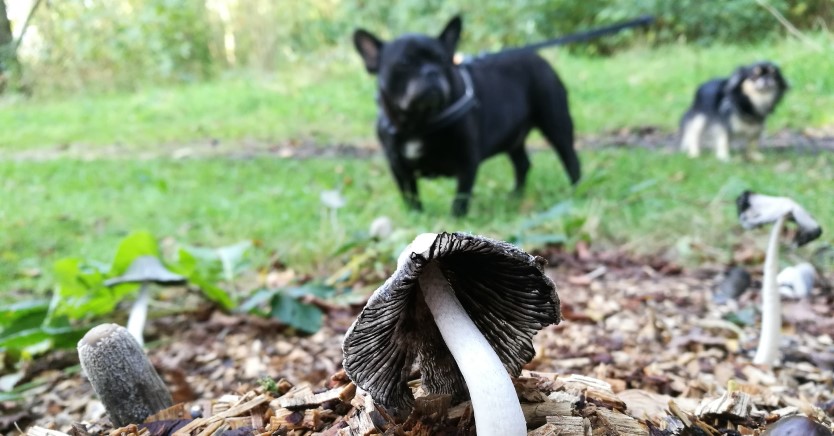Ask Dr. Jenn: Are Wild Mushrooms Dangerous for My Dog?
We just moved from an apartment to a house with a nice, fenced yard where my dog can run and play. But I noticed some mushrooms growing in the yard. My dog will eat almost anything. Is it safe for him to eat mushrooms?

I don’t know about you, but I find mushrooms mysterious and fascinating. It seems like they grow overnight – one day your yard is nothing but grass and the next day there is a cluster that resembles a Smurf village growing under a tree.
While mushrooms may be pretty to look at, some have the potential to make your pet very sick and potentially cause death. Mushrooms with amanitin toxins cause severe GI signs within the first twenty-four hours, followed by severe liver failure 24-48 hours later. These toxins are found in the appropriately named mushrooms “death cap” and “death angel”. Other mushrooms cause neurologic signs, such as stumbling, sedation, tremors, and seizures.
Less toxic mushrooms may cause vomiting and diarrhea that is rarely fatal. Most pets recover in 1-2 days with supportive care. Hallucinogenic mushrooms cause abnormal behavior, such as howling, rapid eye movement, stumbling, and an increase in body temperature. The biggest risk is your pet will hurt himself during these hallucinations, but once the toxins are out of their system, they usually make a full recovery.
Are All Wild Mushrooms Poisonous?
The good news is that of the thousands of mushrooms growing in the wild, only a fraction are toxic. You can find a number of articles online that give you tips on how to identify toxic mushrooms based on their cap color, presence of spores, their stem length, shape of their gills, and other characteristics, but the difference between a toxic mushroom and a nontoxic mushroom can be very subtle making mushroom identification quite challenging. It is recommended to leave mushroom identification to the experts. Assume any wild mushroom has the potential to be toxic and remove it from your yard right away.
What To Do If Your Dog Eats a Wild Mushroom
What should you do if your dog eats a wild mushroom? Because of the challenge of identifying the exact type of mushroom that was ingested, it is advised to seek immediate veterinary advice. If the mushroom was eaten within an hour, getting your dog to throw up will likely be recommended. Your veterinarian may give your dog medication to induce vomiting or may advise you on something you can give at home, such as hydrogen peroxide. Depending on the amount eaten and how soon you are able to get your dog to vomit, your veterinarian may also administer activated charcoal to your dog to bind toxins in the GI tract.
If your dog suddenly develops vomiting or diarrhea or is showing neurologic signs such as stumbling or tremors and you find mushrooms in your yard, seek emergency medical treatment right away. Take a photo of the mushrooms or put them in a plastic bag and bring them with you to the vet clinic. Knowing the potential toxin can help guide treatment and help recovery.
How to Protect Your Dog from Toxic Mushrooms
The best way to protect your dog from toxic mushrooms is to avoid exposure. Check your yard regularly for mushrooms. Many mushrooms like to grow in dark, damp places, such as under trees or bushes. When walking your dog in wooded areas, keep him on a leash and away from wild plants and mushrooms. Teach your dog commands such as “leave it” or “drop it” in case you encounter any potential hazards on your walk.
To learn more about the types of mushrooms that grow in your area, contact your local poison control center or agriculture extension service. Learn the conditions and seasons when certain mushrooms grow so that you are better prepared to watch for their sudden appearance.
Ready to start saving money on pet wellness care?
Then take a look at Mint Wellness, the pet wellness plan that provides fast reimbursement on routine pet care. Save on vaccinations, wellness exams, preventatives, dental, and more!
Learn More